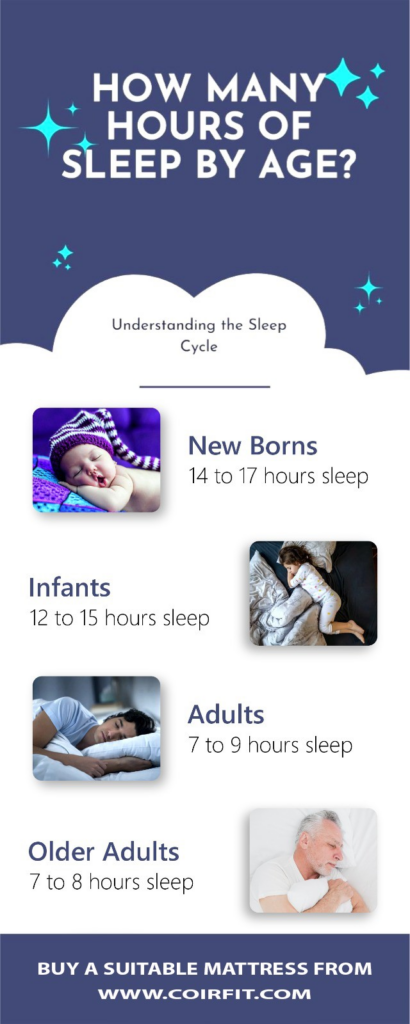

Coirfit
The Essential Guide to Sleep: How Many Hours Do You Really Need at Every Age?
- ,
- , Lifestyle, Mattress Stores
Sleep is a vital part of our daily lives, directly impacting our physical and mental well-being. However, the amount of sleep required varies depending on age. In this article, we will explore how many hours of sleep are recommended for different age groups and discuss the importance of obtaining adequate rest for optimal health.
Understanding the Sleep Cycle
The sleep cycle consists of distinct stages that alternate throughout the night. These stages are essential for different aspects of physiological and mental restoration. The sleep cycle comprises two main phases: deep sleep and Rapid Eye Movement (REM) sleep. Deep sleep, also known as non-REM sleep, is characterized by slow brain waves and physical relaxation. During this stage, our body repairs tissues strengthens the immune system, and releases growth hormones. On the other hand, REM sleep is characterized by rapid eye movements and intense brain activity. It is in this phase that we experience vivid dreams, consolidate memories, and promote cognitive functioning.
Nap Needs in Infants and Toddlers
In the first year of life, infants have varied sleep patterns that gradually evolve over time. Newborns (0-3 months) spend most of their time sleeping, with an average duration of 14 to 17 hours per day. As they grow, the need for sleep decreases slightly. By the ages of 1 to 2, toddlers require about 11 to 14 hours of sleep, including naps. Adequate sleep is vital for their growth and development, as sleep deprivation may lead to behavioral issues, impaired cognitive function, and delayed physical growth.
Sleep Requirements for Children
As children enter the preschool years (3-5 years old), their sleep needs stabilize further. The recommended duration of sleep for this age group is 10 to 13 hours, including daytime naps. Establishing healthy sleep routines is crucial during this stage. Consistent bedtimes and calming pre-sleep rituals help children transition smoothly into sleep. It is common for children in this age group to experience sleep issues such as bedtime resistance, night awakenings, or nightmares. Implementing appropriate strategies, such as creating a sleep-friendly environment and using relaxation techniques, can address these challenges effectively.
The Importance of Sleep in School-Age Children
Sleep requirements evolve as children enter the elementary school years (6-12 years old). At this stage, children typically need 9 to 12 hours of sleep per night. Inadequate sleep negatively impacts their academic performance, memory retention, and cognitive abilities. It is essential to establish consistent sleep schedules, limit the use of electronic devices before bedtime, and create a relaxing sleep environment to optimize sleep quality. Research suggests that maintaining a healthy sleep routine during this period can lead to improved school performance and overall well-being.
Sleep Challenges in Teenagers
During adolescence (13-18 years old), teenagers experience significant biological changes that affect their sleep patterns. The recommended sleep duration for this age group is 8 to 10 hours per night. However, due to various factors such as increased academic demands, social activities, and technology use, many teenagers struggle to get sufficient sleep. The use of electronic devices, particularly before bedtime, can disrupt their sleep-wake cycle. Establishing healthy sleep habits, setting consistent bedtimes, and promoting a technology-free sleep environment can help mitigate these challenges.
Sleep Requirements for Young Adults

Young adults, aged 18 to 25 years, require around 7 to 9 hours of sleep per night. However, achieving adequate sleep can be challenging in this age group due to the competing demands of work, social life, and personal goals. It is crucial to prioritize sleep and find a balance that allows for sufficient rest. Creating a bedtime routine, ensuring a comfortable sleep environment, and practicing stress reduction techniques can significantly improve sleep quality in young adults.
Sleep Changes in Middle Age
As individuals enter their 30s, 40s, and 50s, sleep patterns undergo natural changes. It becomes common to experience a decrease in the amount of deep sleep and more frequent awakenings during the night. Middle-aged adults may also face various sleep disorders, such as insomnia, sleep apnea, or restless leg syndrome. These disruptions can negatively impact sleep quality and overall well-being. Adopting strategies such as maintaining a consistent sleep schedule, practicing relaxation techniques, and seeking medical advice when necessary can help manage sleep disturbances effectively.
Sleep in the Golden Years
Sleep patterns further evolve as individuals reach older adulthood (60+ years old). Seniors and older adults typically require 7 to 8 hours of sleep, although individual variations exist. Sleep disorders become more prevalent in this age group, including conditions like sleep apnea, restless leg syndrome, and insomnia. Promoting healthy sleep habits becomes paramount during the golden years. Creating a sleep-friendly environment, engaging in physical activity, and seeking professional help for sleep disorders can improve sleep quality and overall health in aging populations.

The Impact of Sleep Deprivation on Health
Chronic sleep deprivation can have severe consequences on both physical and mental health. Inadequate sleep increases the risk of developing chronic diseases such as obesity, diabetes, and heart disease, and mental health disorders such as depression and anxiety. Lack of sleep affects hormone regulation, immune function, cognitive performance, and emotional well-being. Prioritizing sufficient and high-quality sleep is crucial for maintaining overall well-being and reducing the risk of multiple health conditions.
Individual sleep requirements are influenced by genetic factors, with some individuals naturally needing more or less sleep than others. Genetic variations affect the sleep-wake cycle, sleep structure, and overall sleep duration. Understanding the role of genetics can help individuals better comprehend their unique sleep needs and adjust their routines accordingly. However, it is essential to remember that genetics are not the sole determining factor and that lifestyle and environmental factors also play a significant role in sleep patterns.
Napping: Pros and Cons
Napping can have both positive and negative effects on sleep and overall daytime functioning. Short, strategic naps can boost alertness, improve mood, and enhance cognitive performance. However, long or irregular napping can interfere with nighttime sleep, leading to difficulties falling asleep or staying asleep. It is important to incorporate naps into daily routines judiciously, keeping them short (15 to 20 minutes) and scheduling them earlier in the day to minimize their impact on nighttime sleep quality.
Promoting Healthy Sleep Habits
Establishing healthy sleep habits is crucial for optimizing sleep quality and overall well-being. Consistent sleep schedules, where individuals go to bed and wake up at the same time each day, help regulate the body’s internal clock. Creating a comfortable sleep environment, with a supportive mattress, appropriate room temperature, and minimal noise and light disruptions, promotes restful sleep. Incorporating relaxation techniques, such as deep breathing exercises, meditation, or aromatherapy, can further enhance sleep quality and reduce stress levels.
The increasing use of electronic devices, especially before bedtime, has a significant impact on sleep quality. The blue light emitted by these devices suppresses the production of melatonin, the hormone that regulates sleep. The stimulation provided by technology can also interfere with the relaxation needed for sleep onset. Minimizing technology use before bed, creating device-free bedrooms, and implementing digital detox practices can help protect sleep quality and promote better overall well-being.
Sleep Disorders: Identifying and Managing
Numerous sleep disorders can significantly disrupt sleep patterns and quality. Insomnia, characterized by difficulties falling asleep or staying asleep, affects a substantial portion of the population. Sleep apnea, a condition where breathing repeatedly stops and starts during sleep, can lead to daytime fatigue and increased health risks. Restless leg syndrome causes uncomfortable sensations in the legs, often accompanied by a strong urge to move them. Identifying the warning signs and symptoms of these disorders and seeking medical evaluation is necessary.
Summary: Finding the Right Balance
While recommended sleep durations exist for different age groups, it is crucial to acknowledge individual variations and listen to our body’s needs. Some individuals may naturally require more or less sleep than the average recommendation. Striving to achieve a balance between meeting one’s unique sleep needs, maintaining a healthy lifestyle, and managing daily responsibilities is essential. By prioritizing sleep and cultivating healthy sleep habits, individuals can experience improved overall well-being and maximize their potential in various aspects of life.

FAQs About Sleep Needs by Age
Q1: How many hours of sleep does a newborn need?
A1: Newborns require around 14 to 17 hours of sleep per day, with individual variations.
Q2: Can teenagers function well with less than 8 hours of sleep?
A2: While individual differences exist, most teenagers need 8 to 10 hours of sleep for proper functioning.
Q3: Are afternoon naps beneficial for adults?
A3: Short, strategic naps (15 to 20 minutes) can provide a quick boost in alertness and mental performance for adults.
Q4: Do older adults need less sleep than younger adults?
A4: Older adults typically require 7 to 8 hours of sleep like younger adults, but individual variations exist.
Conclusion
The significance of prioritizing sufficient and high-quality sleep cannot be overstated. Sleep is crucial for our physical, mental, and emotional well-being at every stage of life. By implementing the tips and strategies discussed throughout this article, individuals can promote healthy sleep habits and reap the benefits of restorative rest. Remember, a well-rested body and mind are essential for leading a fulfilling and healthy life. To purchase a comfortable mattress, visit https://www.coirfitmattress.com
To know more about Coirfit Updates and Sleep Tips, Binge on-

To know more about Coirfit Updates and Sleep Tips, Binge on-















